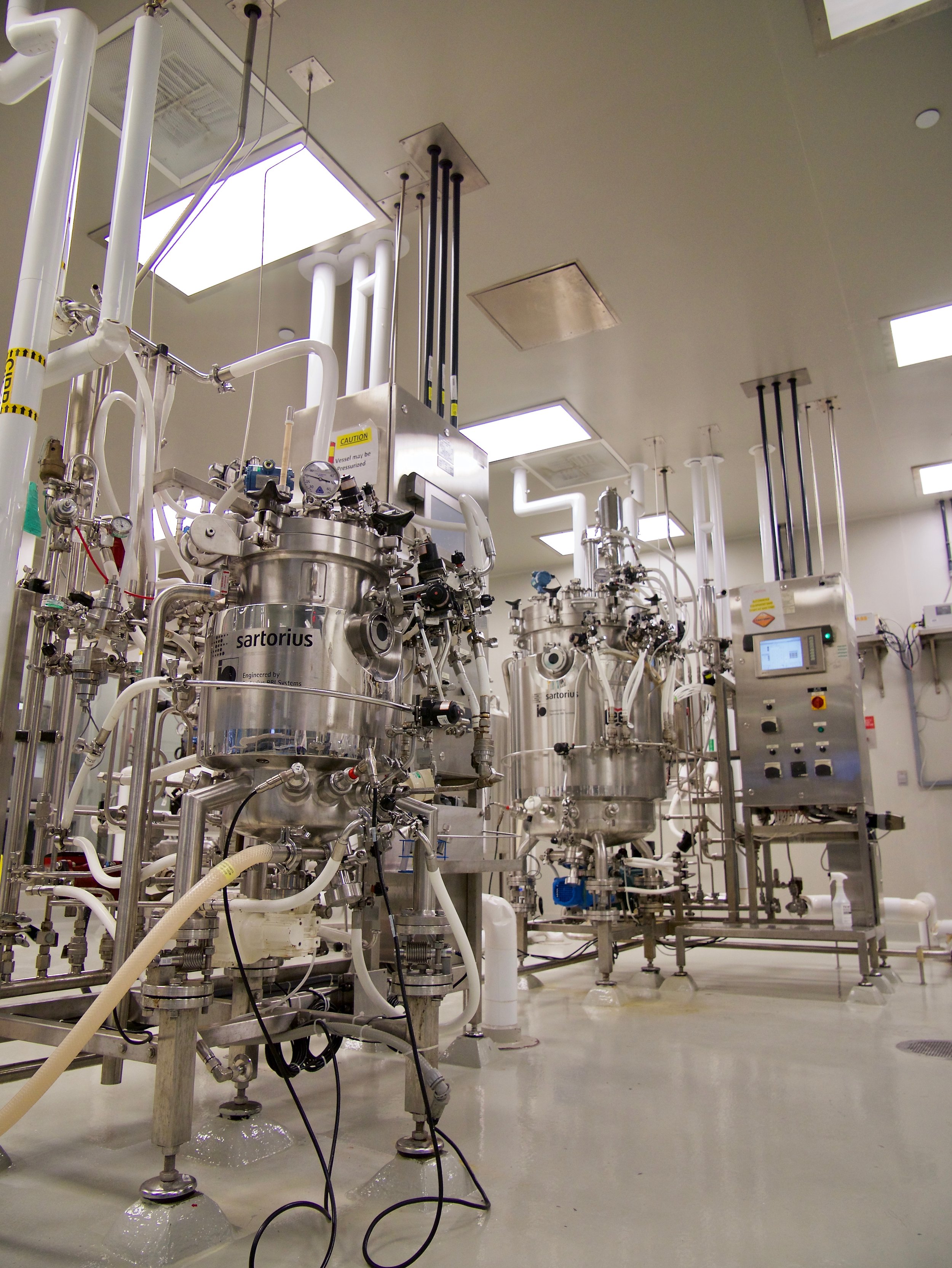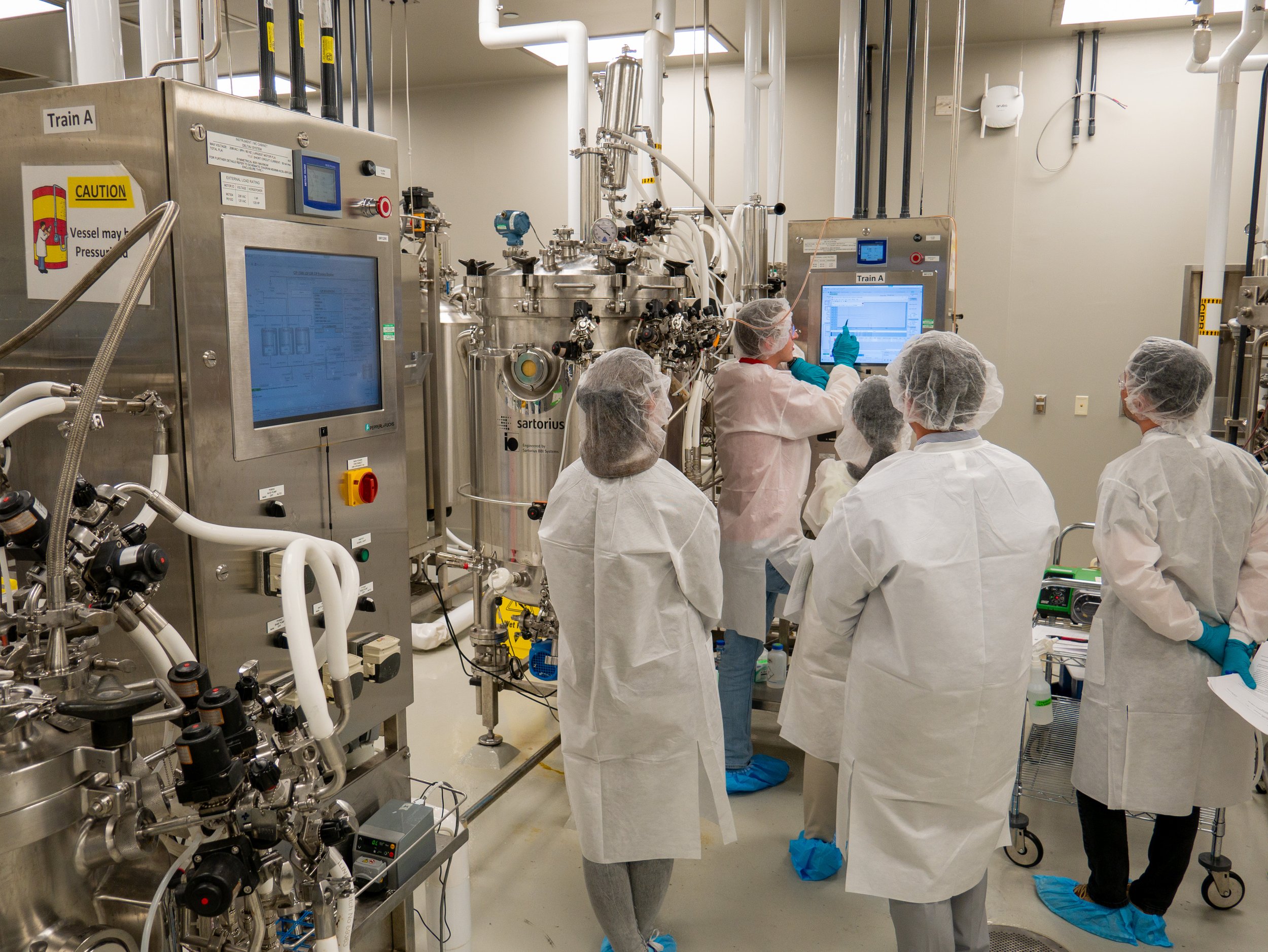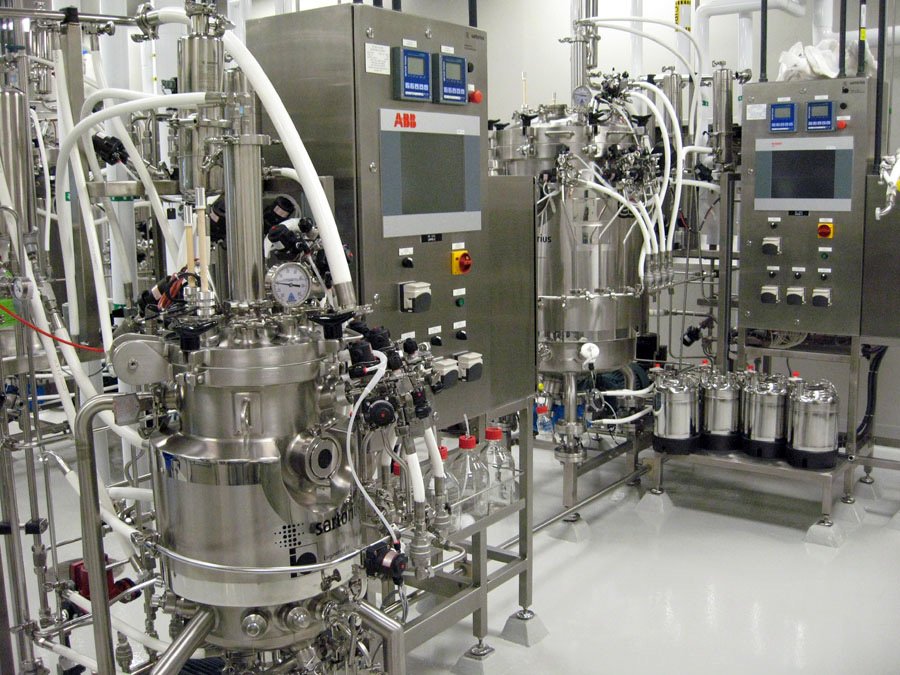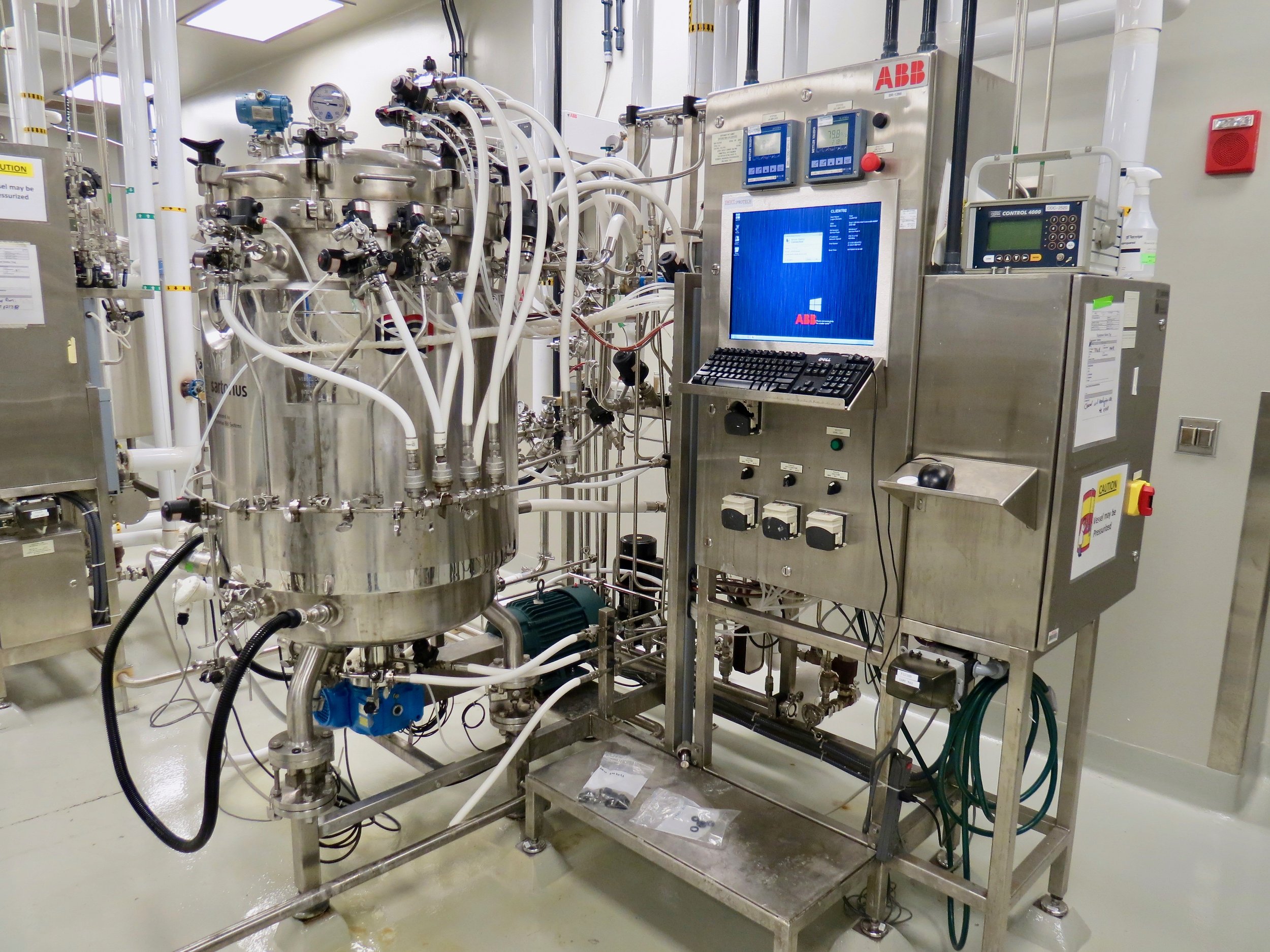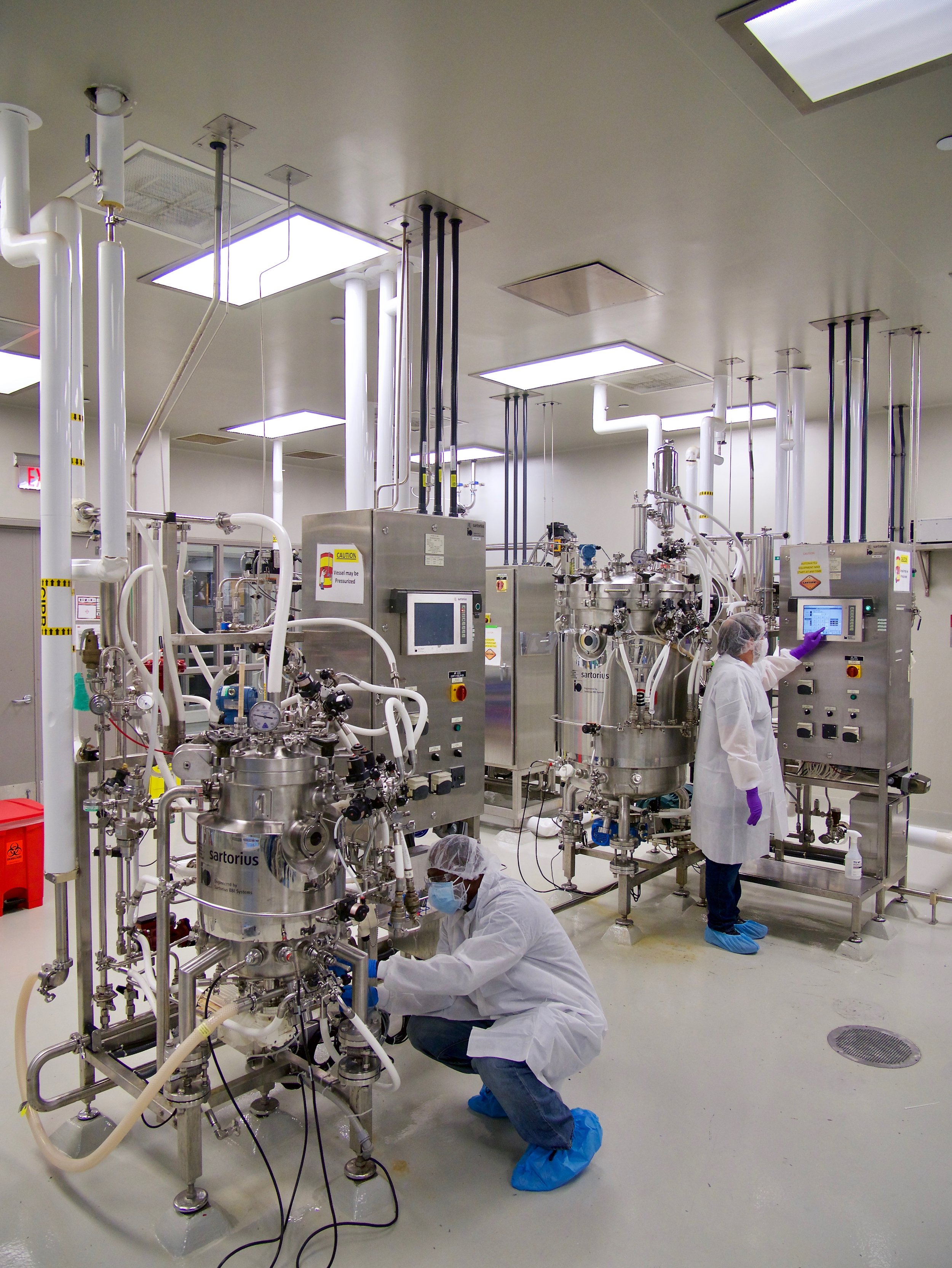BioMADE: Revitalizing U.S. Biomanufacturing and Fostering Collaboration
Article originally published in SIMB News | All photos courtesy of BTEC. Copyright North Carolina State University
The 2023 SIMB Annual Meeting took place in Minneapolis, MN, bringing together over 250 presenters and attendees from industry and academic institutions to discuss advances in microbial biotechnology. The industry-academic exchange that takes place at the SIMB conferences is a great example of the collaboration that fuels biomanufacturing innovation. This year’s meeting featured a special session guided by BioMADE. BioMADE is a Manufacturing Innovation Institute (MII) and part of the national network of Manufacturing USA institutes, which aim to secure U.S. global leadership in advanced manufacturing through large-scale public-private collaboration. The institute was officially launched in April 2021 with an $87 million, seven-year award from the Department of Defense (DoD) and received a $450 million budget increase in March 2023. BioMADE was created to serve as a connector and partnership facilitator for the bioindustrial manufacturing sector. With locations in Minneapolis-St. Paul, MN, and Emeryville, CA, BioMADE’s presence in the heart of America provides a strategic advantage in connecting the coastal innovation hubs and revitalizing the feedstock-rich regions of the U.S. Over the two years since its launch, BioMADE has grown to over 275 member organizations representing 38 states and invested over $75 million in 65 projects from 63 different member organizations. As the institute continues to grow, so does the scope and scale of its programs. From building partnerships across the industry to educating the future workforce and investing in critical biomanufacturing infrastructure, BioMADE leads important programs that provide essential opportunities for its members and the biomanufacturing industry at large.
Building the U.S. Biomanufacturing Industry
BioMADE works to realize the economic promise of industrial biotechnology by building a sustainable, domestic end-to-end bioindustrial manufacturing industry, developing technologies to enhance U.S. bioindustrial competitiveness, de-risking investment in infrastructure, and expanding the biomanufacturing workforce. “The overarching vision of BioMADE is to establish a strong and resilient domestic industrial biomanufacturing base,” says Dr. Douglas Friedman, CEO of BioMADE. “That means being able to produce industrial chemicals and materials using biological systems and have that production occur principally in the United States.”
The U.S. government has demonstrated its commitment to establishing a strong biomanufacturing base with the signing of the Executive Order on Advancing Biotechnology and Biomanufacturing Innovation for a Sustainable, Safe, and Secure American Bioeconomy signed in September 2022, followed by outlining the Bold Goals for U.S. Biotechnology and Biomanufacturing in March 2023. Some of these ambitious “Bold Goals” for the next two decades include reducing greenhouse gas emissions by 50% and methane emissions by 30% through biogas capture and upgrading the food production practices; replacing more than 90% of conventional plastics with bio-based, recyclable-by-design polymers; and transforming supply chains by producing at least 30% of chemicals via sustainable and cost-effective biomanufacturing pathways, among others.
Achieving these goals will require not only commitment from the government but the coordinated work of industry and academic allies to drive forward the development of various technologies that will power up the U.S. bioeconomy. Partnerships between private companies, academic institutions, non-profits, and government organizations can provide investment mechanisms for the development of new technologies, create jobs and market opportunities, facilitate technology transfer, and accelerate commercialization of those technologies to create meaningful impact. BioMADE plays an important role in facilitating partnership building. “We have members across the country from academia, industry, nonprofit research organizations, and the federal government,” says Friedman. He underscores that making connections is an important part of BioMADE’s job: “We do this through BioMADE projects and program activities, but also by listening to our members and connecting them with the resources and expertise they need. If our member organizations build a successful collaboration, that's a success for us. That's the value that we're trying to bring to the network and part of why we exist.”
BioMADE does much more than just facilitate collaboration; it also connects its members with funding opportunities. “At our core, our job is to help facilitate solutions for the industry,” says Friedman. “We work with the Department of Defense, as well as other agencies including NIST, the Department of Commerce, NSF, and others to bring resources to our members in terms of funding projects.” BioMADE-funded projects focus on developing new bio-based products and processes, accelerating technology commercialization, and training the future biomanufacturing workforce. The funding opportunities span three core program areas: Technology & Innovation, Education & Workforce Development, and Safety, Security, Sustainability, and Social Responsibility (4S).
Project Calls
To support the continued development of the U.S. biomanufacturing industry, BioMADE regularly puts out Project Calls that address needs in the biomanufacturing industry. Project Calls may focus on:
Technology & Innovation: Enabling biomanufacturing technologies identified in BioMADE’s Technical Roadmaps. Technical research and development priorities are established and updated annually by the BioMADE Technical Committee, a working group composed of representatives from member organizations.
Education and Workforce Development (EWD): Establishing a well-trained workforce that can fulfill the needs of the growing industry. This includes partnering with K-12 schools, community colleges, universities, and professional development organizations to establish new science and technology educational programs, as well as providing coordination and suggesting improvements for programs already in place. Education and Workforce Development priorities are established and updated annually by the BioMADE EWD Committee.
Safety, Security, Sustainability, and Social Responsibility (4S): Advancing responsible, safe, and ethical biomanufacturing. These project types aim to facilitate responsible bioindustrial manufacturing by engaging with key stakeholders, address the ethical and security concerns of the technologies being developed, and increase public understanding of bioindustrial manufacturing.
Topic-specific Project Calls: Made available based on funding opportunities, these may focus on a specific priority area such as bioreactor innovation.
Cross-disciplinary solutions: Projects that advance biomanufacturing innovation through various applications.
BioMADE Membership
BioMADE is building a vibrant biomanufacturing network across the U.S. BioMADE members include established companies, start-ups, universities, community colleges, and nonprofit organizations. Member organizations have access to funding opportunities through BioMADE’s Project Calls, networking opportunities to connect with U.S. government leaders as well as for finding and teaming up with partner organizations to extend their research and development capabilities, member-exclusive events, such as the BioMADE Member Meeting, and valuable resources like the Technical Roadmap. The Technical Roadmap helps guide research efforts, provides a vision for advancing biomanufacturing processes and technologies to commercial readiness, and outlines actionable needs and steps to reach that vision. Members also contribute their input to the roadmaps and blueprints that guide the industry, gain professional experience by serving on the committees and subcommittees that shape BioMADE activities, increase the visibility of their work, and can receive Institute Project Intellectual Property benefits. The membership community is growing rapidly and bringing in more talent and resources every year. This year’s BioMADE Annual Member Meeting hosted over 350 attendees in Minneapolis; next year’s event is scheduled for May 29-31, 2024. Any organization working to advance biomanufacturing, from universities and community colleges to large corporations, start-ups, venture capital firms and non-profits, can become a member and start taking advantage of these benefits.
De-Risking Investment
BioMADE is facilitating the development of a robust bioindustrial manufacturing industry by de-risking investment in ambitious, large-scale, or novel technologies and projects. One BioMADE project, De-Risking Toxic Product Production led by Amyris, is demonstrating this through a novel approach for in situ removal of growth-inhibitory products to increase the overall yield. Many industrially relevant compounds such as terpenes – which make valuable flavor and fragrances, alternative sweeteners, and cannabinoids – exhibit growth-inhibitory properties, especially when these molecules are produced at commercially relevant titers. The standard methods employed at smaller scales, such as the addition of organic oily overlay, are not effective enough for some species in large-scale, high-density fermentations. “To make our product at a commercially relevant scale, we needed to drive a more creative solution,” says Paul Hill, Senior Vice President of Process Development and Engineering at Amyris.
Amyris wanted to test a novel method for in situ product extraction that can be useful in larger-scale fermentation by building a 20-liter pilot-scale prototype device; however, building a pilot-scale system required substantial investment: “There was a lot of risk associated with [the project] because we only had a limited amount of data, so we had put the project on hold,” says Hill. After the funding for this project was secured through BioMADE, Amyris revived the project. “This is a great example of a technology that was associated with some risk that we were able to execute thanks to the support from BioMADE.”
The pilot project was successful: “It worked great,” says Hill. “I remember I was actually giving BioMADE a tour when we ran our first pilot-scale fermentations. It happened to be the very first time I saw the plots of the metabolism of the culture. Typically, when the product accumulates in the tank, it imposes a toll on the yeast, so their metabolism slows down, and you can see it by measuring the oxygen uptake rate. But here the metabolism went up and stayed high. It was the fifth or sixth day of [the fermentation]. It was dramatic.”
This provided the validation that the scientists needed for scaling up this process and resulted in a follow-up project, Project MONDE, which was funded through a special BioMADE Project Call on advancing bioreactor design and development thanks to financial support from Schmidt Futures. The initial pilot-scale project enabled the characterization of this novel approach, as well as determining which parameters are important for scaling up the process. In Project MONDE, Amyris is partnering with Sudhin Biopharma to scale the technology from a 20-liter to a 300-liter bioreactor scale for a molecule of interest. “The success with the initial project not only helped us get an award to continue developing the technology, but we actually have a novel molecule target that we're now going to use this technique for.” The goal of this project is to demonstrate the ability to aseptically carry out large-scale, longer fermentations using the technology characterized at the pilot scale, as well as to perform a techno-economic analysis: “If we're trying to make something at a few dollars per kilogram, it’s important to analyze each parameter,” says Hill. “For instance, something we’ve learned from the techno-economic analysis is that the overlay should be really inexpensive, and we need to recycle it to make [the process] more economical.”
“We’ve been really excited about the collaboration with BioMADE and Schmidt Futures,” says Hill. “They've been very supportive of our efforts to develop the technology and find the applications for it.”
Fostering Collaboration
BioMADE emphasizes collaboration and building strong relationships between industry, academia, and non-profit sectors. Creating a collaborative industry environment is not only a prerequisite for rapid innovation, but also for establishing the best practices, industry standards and benchmarks for bio-based product and process development. As a part of this effort, BioMADE has funded the Benchmarking Synthetic Biology Product Development project led by the University of California, Berkeley. The project, spearheaded by Dr. Robert Leachman, Professor of Industrial Engineering and Operations Research (IEOR) at UC Berkeley, aims to evaluate product development practices across many companies, identify the practices that underlie top performance, and inform organizations of the most effective approaches. Leachman had previously directed the Competitive Semiconductor Manufacturing Program, in which over 100 semiconductor fabrication facilities worldwide were benchmarked to determine the practices which explain the best manufacturing performance. He believes that the bioindustrial manufacturing industry needs a similar initiative: “If you're going to manufacture a product, you have to have processes that are repeatable, controllable, and successful,” says Leachman. “The best way to improve a whole industry is to benchmark and share best practices. That will move everybody up the fastest way.”
Benchmarking the biomanufacturing industry comes with its own set of challenges, one of which is the high degree of variability in biological processes: “There's enough noise in biology itself, so we need to be able to control the noise across processes and equipment if we want to make progress,” says Leachman. “Whatever people's key performance indicators are—yield or titer or productivity—the signal-to-noise ratio really matters when it comes to measuring improvement and deciding whether to pursue something or not.” This is why it is essential to create industry-wide standards for processes, workflows, and assays commonly used in R&D pipelines, as well as to establish commercial readiness metrics for products. During this two-year project, the UC Berkeley researchers will collect metrics to gauge process variation, repeatability, and stability of common industry workflows such as high-throughput screening (HTS), fermentation, downstream process development, and assays, as well as for the HTS-to-fermentation prediction performance. All data will be reported anonymously or in aggregated form to protect confidential information.
Six BioMADE member companies (R2DIO, Antheia, Geno, Amyris, Ginkgo Bioworks, and Oobli) have already joined the project and more are encouraged to participate. Participating BioMADE companies are asked to contribute in-kind labor to record the data needed to calculate the metrics. Additionally, companies are asked to host site visits by the UC Berkeley researchers working on this project: “We will spend time with the research and development groups in all the companies to understand their practices and try to correlate them with the metric scores,” says Leachman. “Then we can determine which practices seem to lead to better, more consistent outcomes.” This initiative underscores the benefits of establishing a biomanufacturing community: “When you're benchmarking, the bigger pool you have to draw from, the more opportunity to find good ideas,” he says. At the end of the project, the anonymized metrics and best practices will be shared with BioMADE members to support growth across the industry: “The idea is that everybody can benefit from seeing scores. You can get a tremendous incentive for engineers if you see where you stand and realize what's possible,” thinks Leachman.
Educating the Workforce
Biomanufacturing is a rapidly growing industry that is expected to add thousands of new jobs in the next decades. Establishing a well-trained workforce is a necessary driver for growth and is one of the three key program areas BioMADE focuses its efforts on. “If you don't have a trained workforce ready at the right time, you can't have an industry,” says Friedman. “There's a lot of incredible education and training work in biotechnology that goes on around the country, but we're really focused on manufacturing jobs, which will be at the core of this industry, and there's just not enough going on in that space. Focusing on educating people at the same time you're focusing on developing the underlying technologies is absolutely critical to success.” A BioMADE project led by member North Carolina State University, is developing a comprehensive online course that provides training in the fundamentals of molecular biology and bioprocessing, bioethical principles, and the importance of responsible innovation.
The project is led by Dr. Gary Gilleskie, Executive Director of the Biomanufacturing Training and Education Center (BTEC) at North Carolina State University. The course will focus specifically on bioindustrial manufacturing and will cover topics such as molecular biotechnology fundamentals, biomanufacturing principles and processes, and social dimensions of biotechnology. “Bioindustrial manufacturing is a rapidly growing industry,” says Gilleskie. “Anybody who is new to the industry could benefit from the course.” The course is geared towards professionals, particularly those new to the industry, and is scheduled to roll out in 2024. It is being developed in collaboration between BTEC, Genetic Engineering and Society Center (GES) and Biotechnology Program (BIT) at North Carolina State University. Each of the organizations is working on developing one of the four modules for the course: 1) Introduction to Biomanufacturing and the Course, 2) Molecular Biotechnology Fundamentals, 3) Industrial Biomanufacturing Principles and 4) Processes, and Nexus of Biotechnology and Society. Gilleskie thinks this course can serve as a foundation to establish additional programs in the future: “In addition to being used as a professional development asset, it can get rolled into courses for university students here at NC State or at other institutions.”
BioMADE is developing numerous innovative education and workforce development programs for bioindustrial manufacturing by providing coordination for successful programs that are already in place, catalyzing improvement of those with great promise, and creating new opportunities where gaps exist. BioMADE was recently awarded $510,000 National Science Foundation Grant to Accelerate Bioindustrial Manufacturing Workforce Readiness to accelerate bioindustrial manufacturing workforce readiness. This grant was awarded to BioMADE to develop pioneering new industry-driven curricula for bioindustrial manufacturing in partnership with member Delgado Community College in New Orleans, LA. This project will develop plug-and-play modules that are designed to be dropped into pre-existing courses. Each module will be 6-12 hours long and will include presentations, learning assessments, and lab exercises. BioMADE will also develop, test, and finalize key bioprocessing concept education modules that meet performance benchmarks for bioindustrial manufacturing; encourage a workforce and facilitate career entry through deployment and dissemination of curricula materials; and formalize the Community of Practice (CoP) for agencies, academic institutions, and commercial entities to inform local, regional, and national workforce development efforts.
“BioMADE is uniquely positioned to directly solve some problems using our internal expertise,” says Friedman. “With this NSF award, we can leverage this internal capacity to work closely with our members to drive these technical education efforts that will ultimately be available to the broader industry.”
Vision for the Future
Biomanufacturing is poised to transform all sectors of the economy, manufacture more sustainable products, help the U.S. meet its climate goals, and create more resilient and sustainable domestic supply chains. BioMADE and its members are playing a key role in catalyzing the U.S. bioeconomy by focusing on driving technological innovation, assessing the gaps and filling the needs of the rapidly evolving industry, and preparing the workforce to take up thousands of new jobs that will be created. One of BioMADE’s goals is to accelerate commercialization of biotechnology inventions by bridging the gap between lab-scale research and at-scale manufacturing, the so-called Valley of Death of biotechnology. “One of the things we hear constantly [from our members] is that there's a lack of scale-up infrastructure in the United States,” says Friedman. “We have now launched a program at BioMADE to establish a network of pilot- and intermediate-scale biomanufacturing facilities that will be available to our members to help scale their products faster and more cost effectively.”
As a part of the first phase of this effort, BioMADE received $300 million from Congress to kick-start the network and will be using a portion of those funds to invest in state-of-the-art bioindustrial manufacturing innovation and production campus in Minnesota, with up to an additional $100 million support from Governor Tim Walz and the Minnesota Legislature. The cornerstone of the campus will be a state-of-the-art pilot plant, a critical infrastructure component necessary for scaling up the technologies being developed by biotech start-ups and academic research labs. The Minnesota facility will be the start of 12-15 campuses that will form a nationwide network of biomanufacturing infrastructure projects planned across the U.S. In the meantime, BioMADE will continue to leverage a network of the best available capabilities to help its members drive products to market by connecting them to the resources they need. “We believe that by placing these pilots scale of facilities in a distributed fashion around the country and then having them networked together, we can establish that underlying foundation of collaboration that is ultimately needed to scale products and establish a strong U.S. biomanufacturing industry,” says Friedman.
Get your seat at the table and become a BioMADE member today!

